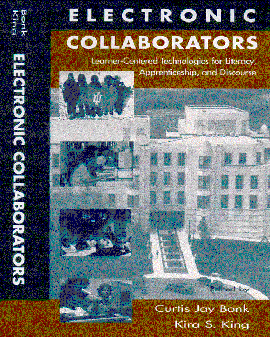
ELECTRONIC COLLABORATORS
Learner-Centered Technologies for Literacy, Apprenticeship, and Discourse
Edited by Curtis Jay Bonk & Kira King
Foreword by Margaret Riel
"Appropriate and timely. . . . Provides a coherent formulation of the relationship between computer collaboration and social constructivism. . . . A strong volume that adds to Erlbaum's impressive list in educational technology."
–Jay David Bolter
Georgia Institute of Technology
"A wonderful new entry to the history of the electronic classroom. It will be useful to educators at every level as they probe the possible. . . . This book's strength is the way in which it addresses a variety of models for electronic collaboration, then has the principals of the projects comment on the pedagogy involved. . . . The variety of settings and objectives offers lots to think about and the effort to ground each model in current pedagogy is excellent. . . . A valuable addition to the literature of technology in education."
–David Tillyer
The City University of New York
Two developments in recent years have converged to dramatically after most conceptions of the teaching and learning process. First, technology has become increasingly interactive and distributed, such that individual learners have available the means to participate in incredibly complex networks of information, resources, and instruction. As these technological advancements facilitate interaction across classroom, university, and worldwide learning communities in both real-time and delayed formats, various instructional design and implementation problems spring forth. Second, the conventional teacher-centered model wherein knowledge is transmitted from the teacher to the learner is being replaced by social constructivist and learner-centered models of instruction. These new learner-centered models place emphasis on guiding and supporting students as they meaningfully construct their understanding of various cultures and communities.
As a consequence of these developments, teachers need guidelines from educational researchers about integrating collaboration and communication tools into their classrooms. This volume presents research on such collaborative technology as it augments and redefines academic learning environments. The studies included here illustrate how schools, teachers, and students are discovering, employing, and modifying numerous new computer conferencing and collaborating writing tasks and tools, and their effects on social interaction and resulting student learning. Documentation is given that will help teachers to make decisions that productively transform learning environments. Three key objectives underlie this volume:
This is a must-read volume for all researchers, scholars, graduate students, and practitioners interested in such fields as sociocultural theory, process writing, cooperative learning, learner-centeredness, distance education, peer conferencing and tutoring, mentoring, electronic collaboration, problem- and project-based learning, collaborative writing, and educational reform.
Go back to Dr. Bonk's Home Page
